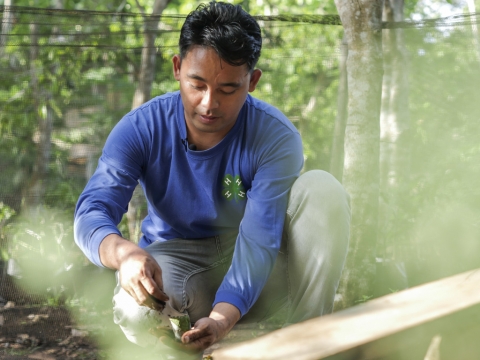In celebration of the Farmers’ and Fisherfolk Month, the ATI puts the spotlight on the innovations of farming champions on "Agri Asenso". (photo by Ashlee Canilang)
DILIMAN, Quezon City—In line with the celebration of the Farmers’ and Fisherfolk Month, the Agricultural Training Institute (ATI) puts the spotlight on farmers and fishers for their outstanding contributions and performance in the agri-fishery sector through its radio program, “Agri Asenso”.
For the first two Saturdays of May, Gawad Saka outstanding high value crop farmer Greggy Saljay and outstanding young farmer Elnard Ympal talked about their respective innovations on integrated, diversified, and organic farming.
Saljay, a Magsasaka Siyentista and owner of a Learning Site for Agriculture (LSA) and Farm School in Pigcawayan, Cotabato, is best known for his cabrito (young goat) production and processing project and production and management practices for dragon fruit, particularly the yellow variety.
“We practice the organic way in farming. We use indigenous materials and resources in managing dragon fruit. For example, we use fermented goat urine as natural insect repellent and foliar fertilizer,” Saljay shared.
Aside from propagating the yellow variety of dragon fruit, Saljay was also recognized for sharing planting materials with other local farmers and for his part in related research projects by establishing a demonstration site in his farm, GBS III Agro Farms.
Saljay is a third generation farmer who grew up in the farm and eventually pursued agriculture in college. After graduating, he took over the farm and started the shift to organic farming.
Now, GBS III Agro Farms is a showcase of goats, native chickens, hogs, high value crops, herbs, and vegetables which are grown in an edible landscape model. As a Farm School owner, Saljay has also organized various training activities on rice production and mechanization, which he admitted to being a challenge at first.
“Introducing new programs or technologies has not been easy. Some still believe in the traditional practice, so it was difficult to teach the farmers at first. But now, they are gradually seeing how effective the program is—from seed selection, land preparation, management, up to mechanization,” he said.
He added that despite the difficulties they experience, especially in this time of a pandemic, the Filipino farmers are to be admired because of their diligence, resilience, and passion for agriculture.
Like Saljay, Ympal started to love farming at a young age. After completing a two-year agriculture course in the Technology Education and Skills Development Authority, he established Elnard’s Integrated Farm in San Juan, Siquijor on a 500-square-meter piece of land and a Php500.00 capital.
“I planted vegetables in a small scale, supposedly for our family’s consumption only. I did not expect that it would develop into a two-hectare farm today,” Ympal remarked.
Because of their elevated location and hilly terrain, the water supply in Elnard’s Integrated Farm became a challenge. To solve this, Ympal came up with his own drip irrigation technology, using plastic soft drink bottles, which earned him recognition from the Department of Agriculture in 2010, at the age of 24.
“As the saying goes, ‘There is no such thing as barren soil, only barren minds,’” he said as he recalled his Gawad Saka win. Eight years after, Ympal and his family also received the Gawad Saka Outstanding Farm Family award.
At present, vegetables, fruit trees, herbs, and flowers, integrated with goat, pigs, cows, chickens, and ducks, can be found in their farm. They also supply herbs and other high value crops to local restaurants and resorts, which are produced not only in their farm but also in other neighboring farms to help the community earn as well.
Looking back on his experiences as a member and leader of the 4-H Club in the regional and national levels from 2010 to 2016, Ympal noted with urgency the need to “open the minds of young people [and show them] that there is money in farming.”
“Today, the average age of farmers is 57 years old, so we need the full force of the youth,” he said.
“Agri Asenso” is the ATI’s weekly teleradyo program on DZRH that features technologies and success stories of farmers and fishers in the country. Saljay and Ympal served as guests during the live broadcast on May 1 and 8, respectively.

